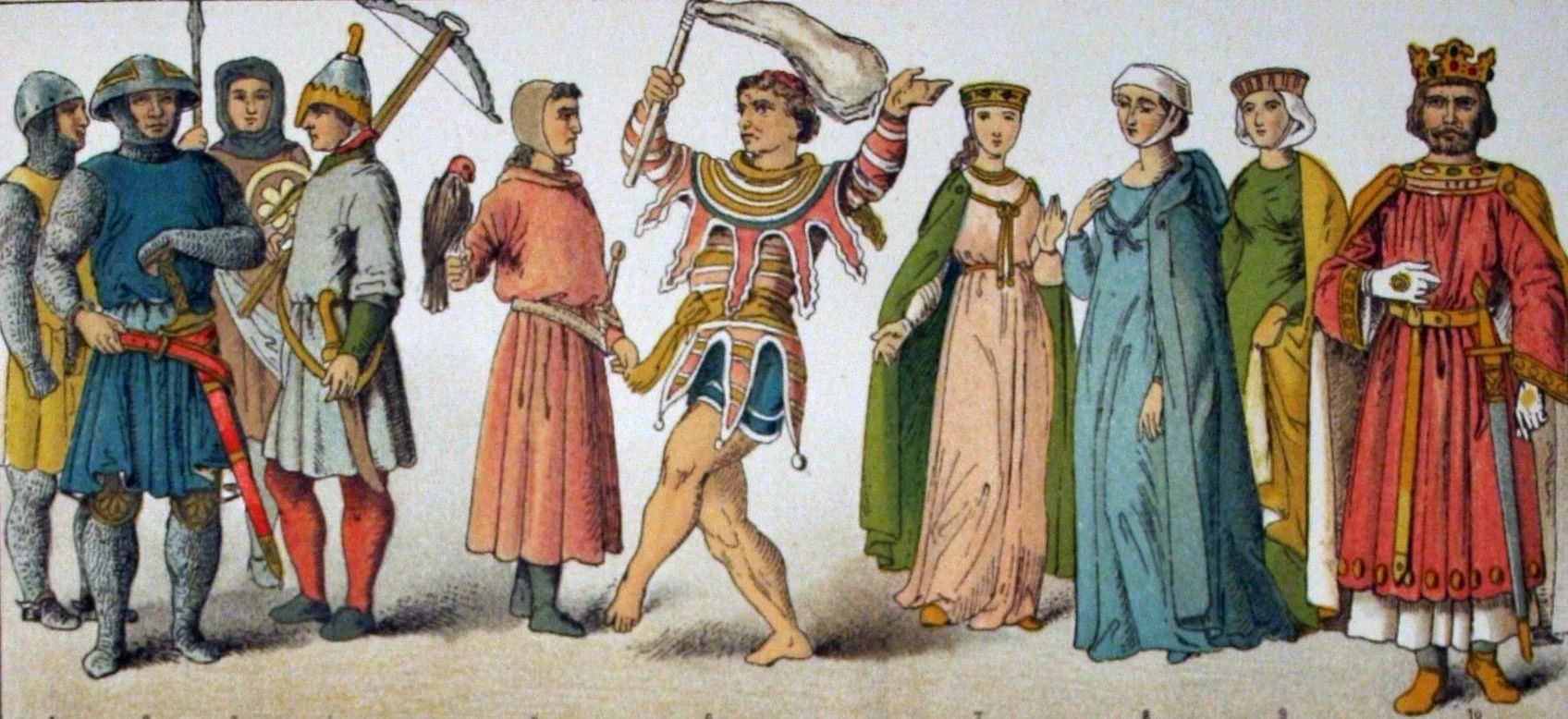Roland le Petour - Celebrity Fool
Fool. Jester. Gleeman. Jongleur. Whatever you call him, this joker was the life of the medieval party.
(posted on April Fool’s Day - but still 100% true)
Fools employed a wide range of activities to enliven the feast. That’s a fancy way to say they sang, they danced, they juggled, they cracked jokes. That costume you’re imagining from the joker card, #53 in the deck? That was real.
Fools wore bright mismatched colors, and this motley highlighted their role, how the fool turned the world upside down. This costume started with donkey ears, then evolved into the three-pronged hat with bells.
Fools were an important part of medieval society. Seriously. Not only did the fool bring levity to the court during a feast, the jester's privilege meant he could speak truth to power like no other category of person. If the king ordered someone executed or flogged, the jester might step in with a joke that allowed the king to show mercy to the unfortunate soul.
Fools didn’t just spend their nights at court. They went out with the troops to war. Jesters would make jokes to calm the nervous troops in their side’s ranks. The fool might charge the enemy all on his own, hoping to make a single enemy soldier break ranks and open themselves to counterattack. Jesters were a part of medieval military strategy.
Fools came in two main types: natural or licensed. Natural jesters were forced into the job because of their physical or intellectual differences. Brutal, right? Medieval people were not PC. Licensed jesters chose this career path, wielding their bauble, their stick topped with a fool’s head, snarkily the yin to the king’s yang. Why would someone take this path? Because for some, it was the best dang job around.
Roland le Petour was a celebrity fool, a professional flatulist. When you read that word, you probably converted it to “flautist,” as in “one who plays the flute” in your head without thinking. That’s also true, he did play the flute, but that is not why anyone remembers him these many centuries later. No, he was a flatulist, a performer who specializes in flatulence-related humor. Let that sink in.
Roland was a professional farter. Yes, le petour means “the farter” in French. And now you’re reading about him more than 800 years after his career. All those monks and scribes who diligently copied ancient manuscripts so that college freshmen can read Plato and Aristotle today? Nobody remembers them. They preserved knowledge for posterity, and they were forgotten. Roland made music with his posterior, and his story lives on. Life can be so unfair.
Sadly, boys in middle school today are denied the knowledge that in the Middle Ages, there was a man who made his living, a really good living, farting for the king of England’s amusement. There has to be a 0.9 or higher correlation with “history that includes stories about professional farters” and “junior high boys interested in the history lesson” that has been ignored by state educational curriculum committees in 50 out of 50 states. Probably Puerto Rico and Guam too. America’s educational system is in the toilet. (hey-oh!)
So what made Roland le Petour special? Yes, he could do acrobatics and all the other jester tricks, but most importantly, he was the favorite of his patron, the king. King Henry II of England (1133-1189) was probably the most senior of all kings of his era, and he loved Roland. The king thought his fool was hilarious.
Roland knew what his patron liked and would rise to the occasion. The biggest feast of the year was at Christmas, and for the climax of his performance he performed a dance that ended with “one jump, one whistle, and one fart, executed simultaneously.” It must have been something to behold.
For this flatulent feat, the jester was rewarded with a giant house and huge plot of land in Suffolk. He was rich! Should you ever meet Harry and/or Megan, the current duke and duchess of Suffolk, please feel free to use this as a conversation starter.
This is all 100% true. If you're skeptical of the veracity of this story, you can of course check Roland’s Wikipedia page. If that's not proof enough, then maybe buy an academic book on the topic, On Farting: Language and Laughter in the Middle Ages, for $60. Toots rake in the big bucks, then and now.
What lessons can you, a modern, well-mannered corporate denizen, possibly learn from Roland le Petour, professional fool who reached his professional peak in 1159? Probably a couple things…
Maybe it’s that it pays to like whatever it is that the boss likes. Maybe that’s karaoke. Get up and sing. Maybe it’s to be all pretentious about wine. Get to swirling your glass with your nose deep in it, yo. If the boss likes it, you LOVE IT!
Maybe it’s that there are career paths that are not featured on career day in school. Those are some of the best jobs. There is a low chance that your high school guidance counselor knew how many high-paying, high-fun, low-effort corporate jobs there were out there.
Maybe it’s that there are lots of ways to make a living. Some “center on joy” than others. Maybe you want to have fun and plan parties. Go for it. Some have more dignity. Maybe that’s not important to you so you aspire to be an influencer. Pick your path. You do you.
Maybe the most important lesson Roland le Petour can teach you now is what all medieval fools tried to show their noble patrons of that lost world: That life can be silly. The structure of society is just something people made up. Flip it on its head, enjoy the joke, and enjoy the ride. Life can be a blast.




